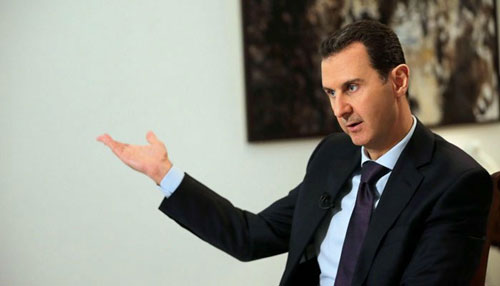Beirut
A decade has passed since the civil war in Syria but Syrian President Bashar al-Assad’s grip on the country remains as strong as ever as he plans to further solidify his position in the presidential elections this year.
When the Arab revolts started toppling autocrats like dominoes in early 2011, Assad’s days looked numbered.
But 10 years on, he has defied the odds, surviving international isolation and the temporary loss of two thirds of Syria’s territory to claw his way back into relevance.
When protests first broke out in Syria in March 2011, there were doubts whether his ruling Alawite minority would be able to withstand the tide of Arab Spring uprisings dramatically reshaping the region.
The leadership mettle of the London-trained ophthalmologist, a reluctant heir when his iron-fisted father Hafez died in 2000, was also in question.
But his patience and cool — coupled with his grip on the security apparatus, the West’s disengagement, and the support of Russia and Iran among other factors — saved him from defeat, analysts say.
“Years after the whole world demanded he leave and thought he would be toppled, today it wants to reconcile with him,” veteran Lebanese politician Karim Pakradouni said.
“Assad knew how to play the long game,” said the politician, who has often acted as a mediator between the Damascus regime and various Lebanese parties.
In 2011, Assad chose to repress peaceful protests with force, sparking an increasingly complex war involving rebels, militants and world powers in which any fighter not on his side was dubbed a “terrorist”.
The conflict has since killed more than 387,000 people, displaced more than half the country’s pre-war population, and seen tens of thousands thrown behind bars.
Ordinary Syrians have seen food prices soar and the Syrian pound plummet in an economic crisis the government has blamed on Western sanctions.
But Assad is still in power and, after a string of Russia-backed victories, his forces are back in control of more than 60% of the country.
The Syrian president always insisted he would come out on top. “He has never faltered. He has stood firm on all his stances without concession, and has managed to take back most of Syria with military might,” Pakradouni said.
Despite tens of thousands of defections, Syria’s army also played a major role in his survival, he said. “This is what made Assad an exception in the so-called Arab Spring.”
In Tunisia, the army abandoned dictator Zine El Abidine Ben Ali when street pressure mounted, Egypt’s military also let go of long-time leader Hosni Mubarak, and in Libya, top brass had already turned against Moamer Kadhafi before his demise.
Analyst Thomas Pierret said: “Army leadership remained loyal because for decades it had been stacked with relatives of Assad and fellow Alawites.”
“The latter probably made up more than 80% of the officer corps by 2011 and held virtually every single influential position within it,” said the researcher at the Institute of Research and Study on the Arab and Muslim Worlds.
A Syrian researcher based in Damascus who asked to remain anonymous said Assad’s “determination and rigour” were also key.—AFP










